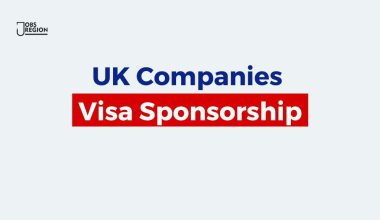Canada continues to be one of the top destinations for skilled immigrants seeking high-paying job opportunities, with visa sponsorship programs providing a pathway to legally work and live in the country. As we approach 2024/2025, the Canadian job market is projected to experience continued demand in key sectors such as technology, healthcare, engineering, and finance.
These fields offer salaries reaching $100,000 and beyond, making them attractive for skilled professionals around the world. Canada’s progressive immigration policies and its reputation for inclusivity and quality of life make it an appealing choice for those looking to build a prosperous future.
Visa sponsorship programs allow Canadian employers to hire foreign workers to fill gaps in the labor market. These programs not only benefit employers by providing them with access to global talent, but they also help immigrants secure high-paying positions with financial stability.
For many, landing a job with visa sponsorship means more than just a salaryit can also be the key to permanent residency and eventual citizenship. The availability of $100,000 visa sponsorship opportunities across various sectors has opened doors for many professionals to enter Canada and contribute to its thriving economy.
In this comprehensive guide, we will explore how to take advantage of visa sponsorship opportunities in Canada for 2024/2025. From understanding visa requirements to learning about the best employment websites and application processes, this article will provide valuable insights for immigrants looking to secure a high-paying job in Canada.
Visa Requirement for Employment
Securing a high-paying job in Canada as an immigrant requires meeting specific visa requirements. The most common visa category for skilled workers is the Temporary Foreign Worker Program (TFWP) and the Express Entry System.
These programs allow Canadian employers to hire foreign nationals when there are no available Canadian citizens or permanent residents to fill specific roles. Both systems are designed to attract highly skilled workers who can contribute to Canada’s economy.
A. Temporary Foreign Worker Program (TFWP)
The TFWP allows employers to hire foreign nationals on a temporary basis to fill labor shortages. To qualify for this visa, the employer must first obtain a Labour Market Impact Assessment (LMIA), which proves that there is a shortage of qualified Canadian workers for the position.
Once the LMIA is approved, the immigrant can apply for a work permit. While this program is designed for temporary work, many workers transition to permanent residency through provincial programs or Express Entry.
B. Express Entry System
Canada’s Express Entry System is an online immigration application system designed for skilled workers. It manages applications for three programs: the Federal Skilled Worker Program (FSWP), the Federal Skilled Trades Program (FSTP), and the Canadian Experience Class (CEC).
Candidates create an online profile and are awarded points based on factors such as age, education, work experience, and language proficiency. Those with the highest scores are invited to apply for permanent residency. Many Canadian employers are willing to sponsor skilled immigrants through Express Entry, particularly for high-demand jobs.
C. Provincial Nominee Programs (PNPs)
Each Canadian province and territory has its own immigration programs, known as Provincial Nominee Programs (PNPs), which target specific labor needs. Immigrants who receive a nomination from a province are more likely to secure a permanent residency invitation through the Express Entry system.
Some provinces, like Ontario and British Columbia, have specific streams for highly skilled workers in sectors like technology and healthcare, making them ideal for those seeking $100,000 salary opportunities.
To work legally in Canada under any of these visa programs, immigrants must meet specific eligibility criteria, which include possessing relevant qualifications, work experience, and in many cases, fluency in English or French.
Salary Scale for Immigrants
The table below outlines the salary scale for high-paying immigrant jobs across different sectors in Canada. These figures reflect average annual earnings based on experience levels.
| Job Sector | Entry-Level Salary ($) | Mid-Level Salary ($) | High-Level Salary ($) |
|---|---|---|---|
| Technology (Software Engineers, Data Scientists) | 70,000 – 85,000 | 90,000 – 120,000 | 130,000 – 180,000 |
| Healthcare (Doctors, Surgeons, Nurses) | 80,000 – 100,000 | 120,000 – 180,000 | 200,000 – 300,000 |
| Engineering (Mechanical, Civil, Electrical) | 75,000 – 95,000 | 100,000 – 140,000 | 150,000 – 200,000 |
| Finance (Accountants, Financial Analysts) | 65,000 – 85,000 | 90,000 – 120,000 | 140,000 – 180,000 |
| Legal (Lawyers, Legal Consultants) | 70,000 – 90,000 | 110,000 – 150,000 | 180,000 – 250,000 |
| Construction (Project Managers, Civil Engineers) | 60,000 – 80,000 | 85,000 – 110,000 | 130,000 – 160,000 |
| Education (University Professors) | 65,000 – 85,000 | 90,000 – 120,000 | 130,000 – 170,000 |
| Aviation (Pilots, Aerospace Engineers) | 80,000 – 110,000 | 130,000 – 160,000 | 170,000 – 220,000 |
| Manufacturing (Operations Managers) | 70,000 – 90,000 | 100,000 – 130,000 | 140,000 – 180,000 |
Application Requirement and Document
Applying for visa sponsorship and employment in Canada involves preparing several key documents to ensure eligibility and compliance with immigration laws. Below are the primary requirements and documents that immigrants should have ready:
A. Job Offer from a Canadian Employer
To apply for a work visa or sponsorship, immigrants must secure a job offer from a Canadian employer willing to sponsor their visa. The job offer should clearly state the job role, responsibilities, salary, and duration of the employment. It must also demonstrate that the employer is offering a competitive salary based on industry standards.
B. Labour Market Impact Assessment (LMIA)
In most cases, employers will need to obtain an LMIA to show that hiring a foreign worker will not negatively impact the Canadian labor market. The LMIA application process is conducted by the employer, but the immigrant must provide supporting documents as needed.
C. Educational Credentials
Applicants must provide proof of their academic qualifications, such as degrees, diplomas, or certificates. For jobs in regulated industries, such as healthcare or engineering, additional licensing or certification may be required. Immigrants may need to have their credentials assessed to ensure they meet Canadian standards.
D. Work Experience Documentation
Providing proof of relevant work experience is crucial, especially for high-skilled positions. This includes letters from previous employers, detailing job responsibilities, duration of employment, and performance. Immigration authorities use this to assess whether the candidate meets the criteria for skilled worker programs.
E. Language Proficiency
Candidates must demonstrate proficiency in English or French, depending on the job and province they intend to work in. This can be done by taking an approved language test, such as the International English Language Testing System (IELTS) for English or Test d’évaluation de français (TEF) for French.
F. Financial Proof and Medical Exam
In some cases, immigrants must show they have enough financial resources to support themselves and their families in Canada. Additionally, a medical exam may be required to ensure that the applicant meets the health standards for living and working in Canada.
Employment Website to Find Opportunities
Finding visa-sponsored job opportunities in Canada can be challenging, but several platforms specialize in connecting immigrants with Canadian employers who are willing to sponsor work visas. Here are some of the best websites to explore:
- Job Bank Canada – The official job site of the Canadian government, offering a wide range of job listings, many of which include visa sponsorship opportunities. It also provides labor market information, helping immigrants understand which sectors are in high demand.
- Indeed.ca – One of the largest job search engines, Indeed allows users to filter job listings by industry, location, and visa sponsorship. Many Canadian employers post job openings on Indeed, making it a valuable resource for immigrants.
- LinkedIn – A professional networking platform that offers job listings and networking opportunities with employers across Canada. Immigrants can connect with recruiters, join industry groups, and apply directly for jobs that offer visa sponsorship.
- Glassdoor.ca – Known for its company reviews and salary insights, Glassdoor is another excellent platform for finding visa-sponsored jobs in Canada. It offers detailed information on company culture and compensation, helping job seekers make informed decisions.
- Workopolis – A popular Canadian job search website, Workopolis features thousands of job listings, many of which include sponsorship opportunities for foreign workers. The site also offers career advice and resources for immigrants entering the Canadian job market.
- CanadaVisa.com – A specialized immigration site that offers resources for immigrants seeking visa sponsorship and permanent residency. It features job listings, visa guides, and tools for assessing eligibility for Canadian immigration programs.
Conclusion
Canada’s $100,000 visa sponsorship opportunities in 2024/2025 present a wealth of possibilities for skilled immigrants looking to build a prosperous career in sectors like healthcare, technology, engineering, and finance. With robust immigration programs, a high standard of living, and competitive salaries, Canada continues to be an attractive destination for global talent. Understanding





